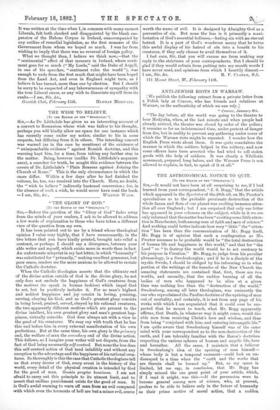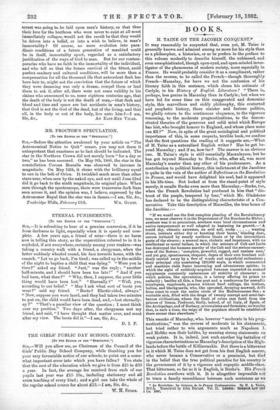THE ASTRONOMICAL NOTICE TO QUIT.
[To THE EDITOR. OF THE "SPECTATOR.'J SIlt,—It would not have been at all surprising to me, if I had learned from your correspondent, "J. S. Bogg," that the article which appeared in the Spectator of the 28th ult. on Mr. Proctor's speculations as to the probable proximate destruction of the whole fauna and flora of our planet was exciting immense atten- tion all over England ; but I am surprised that only one letter has appeared in your columns on the subject, while in it we are only informed that the matter has been "exciting some little atten- tion in Manchester, both among men of faith and men of science." And nothing could better indicate how very" little " the " atten- tion" has been than the communication of Mr. Bogg itself. Mr. Bogg is of opinion that such a conflagration as Mr. Proctor assumes to be probable would be "the total destruction of human life and happiness in this world," and that for "the Lord" so "to destroy the world would be to act contrary to his purpose in Creation." Mr. Bogg, to judge from his peculiar phraseology, is a Swedenborgian ; and if he is a disciple of the mystic Swede, I should be obliged by his informing us in what portion of the writings of the founder of the New Church the amazing statements are contained that, first, there are two worlds, and secondly, that the sudden burning of all the bodies of men who happened to be alive at a given time was nothing less than the "destruction of the world." Swedenborg, among all later theologians, was eminently the one who reproclaimed the Pauline doctrine of the uprising of man out of mortality, and certainly, it is not from any page of his works with which I am acquainted that it could ever be sus- pected that he meant to teach, what Mr. Bogg apparently affirms, that Death, in whatever way it might come, would dis- able men from receiving Christ's love and wisdom, and thus from being "conjoined with him, and entering into angelic life." I am quite aware that Swedenborg himself was of the same mind with your correspondent as to the non-destruction of the earth, and I am tolerably familiar with the Baron's doctrines respecting the various spheres of human and angelic life, here and hereafter. All the same, I maintain that a believer in Swedenborg's idea of the uprising of man himself— whose body is but a temporal vestment—could look on un- dismayed to a time when the "earth and the works that are therein shall be burned up." But, as my space is limited, let me say, in conclusion, that Mr. Bogg has simply missed the one great point of your article, which, if I read it aright, was this :—If the persuasion were to become general among men of science, who, at present, profess to be able to believe only in the future of humanity as their prime motive of moral action, that a sudden.
arrest was going to-be laid upon man's history, so that thus their love for the brethren who were never to exist at all mast immediately collapse, avould not the result be that they would be driven into a belief, or into a wish to believe, in man's immortality ? Of course, no mere evolution into pare- disaic conditions of a future generation of mankind could be in itself, immortality apart, regarded as a satisfactory justification of the ways of God to man. But for our contem- poraries who have no faith in the immortality of the individual, and who tell us that the future survival of the fittest, amid perfect sanitary and cultured conditions, will be more than a compensation for all the thousand ills that antecedent flesh has been heir to, might not the conviction that the future of which they were dreaming was only a dream, compel them or lead them to ask if, after all, there were not some validity in his claims who announced to us, some eighteen centuries ago, that the death of the body is not the death of man,—that flesh and blood and time and space are but accidents in man's history, that God is not the God of the dead, bat of the living, and that all, in the body or out of the body, live unto him P—I am,



































 Previous page
Previous page